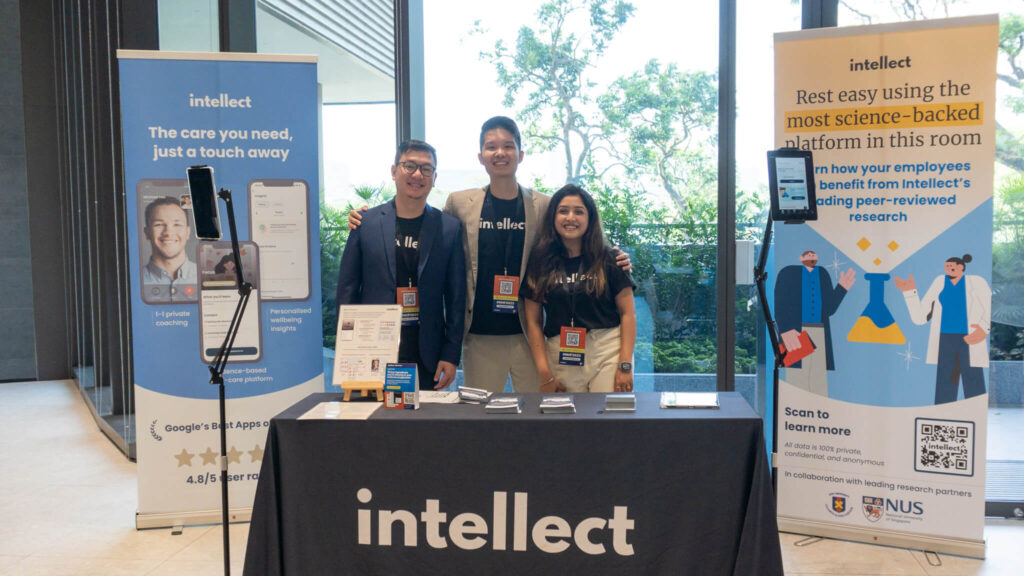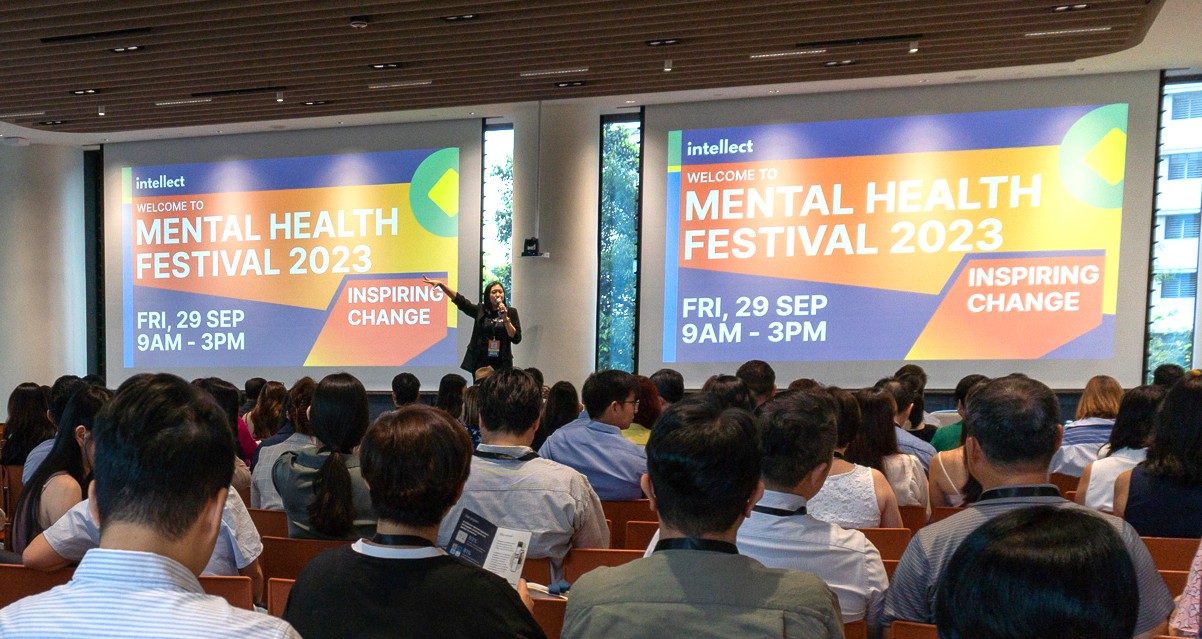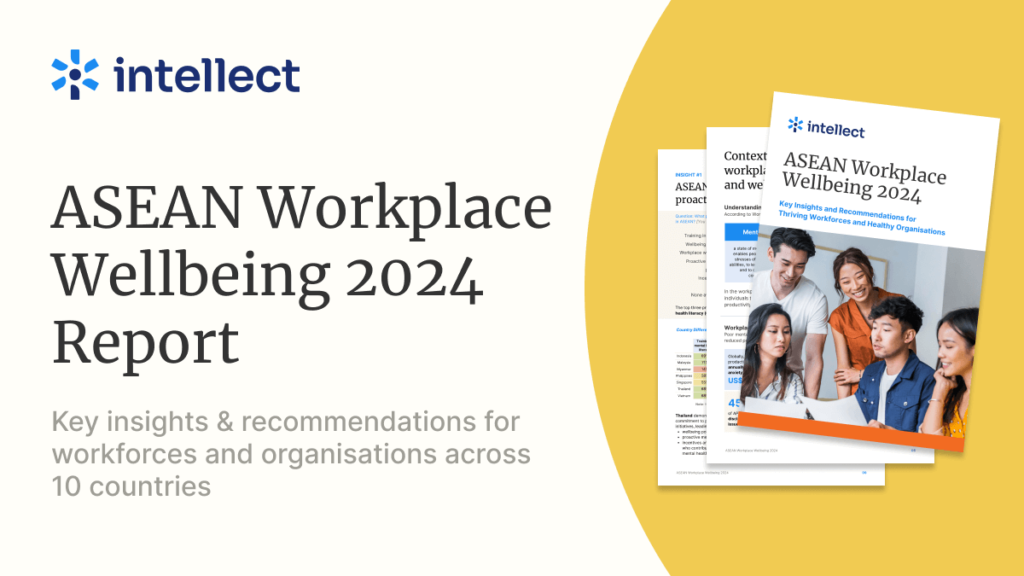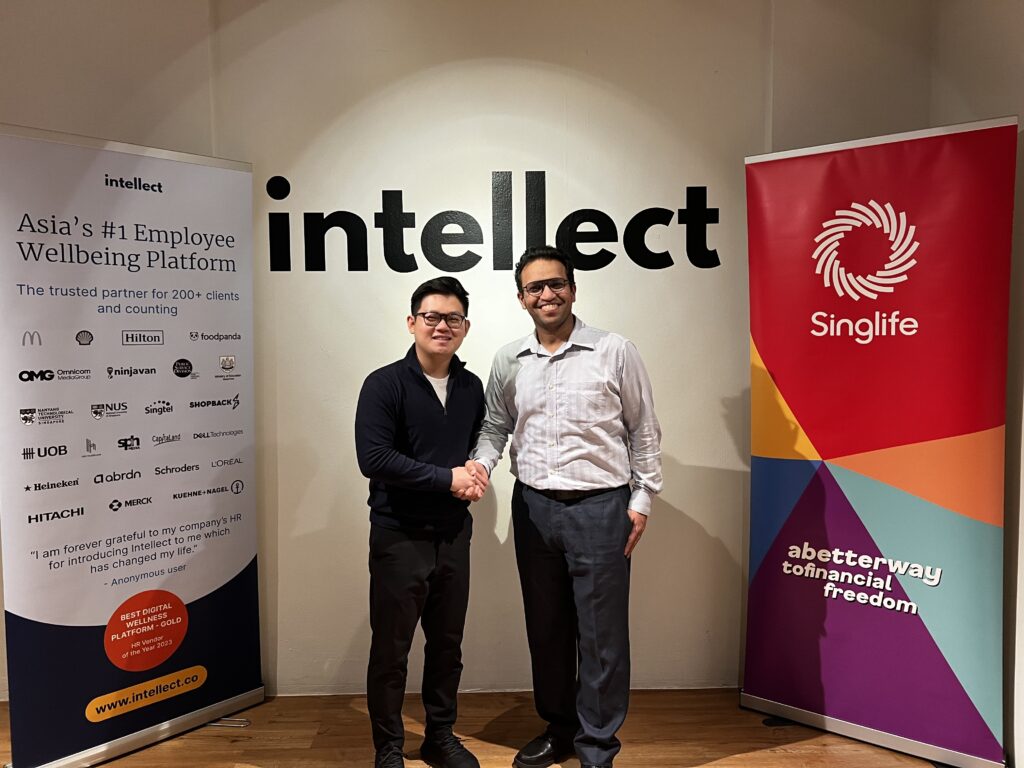Employee wellbeing came to the fore during the pandemic, and now we are at a crossroads: Do we return to our old ways or transform the way we and the next generation live and work?
Mental Health Festival 2023 was conceived with this impasse in mind. Over three days, influential figures in the fields of business, healthcare, and wellbeing from Singapore and the region converged to share the best practices that will define employee wellbeing in the next decade.
In case you missed it, here’s a summary of what they said.
1. Human development – an evolved approach to human resources.
In the session titled “The Next Frontier of HR: Human Development at Work,” Dr. Bob Audrey, CEO and Founder of the ASEAN Human Development Organisation, distinguishes between the concepts of human resource, human capital, and human development.
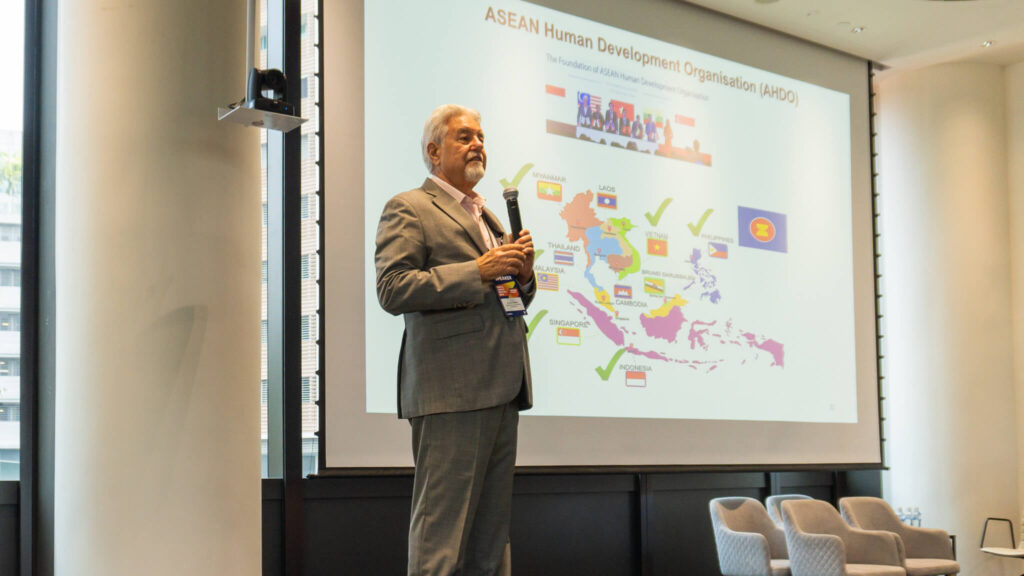
Human resource views people as tools for profit, while human capital quantifies their earning potential. Human development, however, sees employees not only as a means to an end but as the end itself. It takes the view that work can be a developmental experience for your employees, and their growth hinges on employee wellbeing.
“Your leaders have never been trained in business schools. They didn’t do psychology. So you’re left with the very important responsibility of getting them to do something.”
Dr. Bob Audrey, CEO and Founder of the ASEAN Human Development Organisation
Admittedly, Singapore’s policies have scarcely caught up with the latter, though Dr. Audrey anticipates a shift as the country is in a position of leadership when it comes to people management.
Catch up on his session here:
2. Wellbeing isn’t an HR benefit; it’s a business strategy.
Employee wellbeing is often reduced to a checkbox item, but are we overlooking a golden opportunity? In her session titled “Leading from Within: Why Mental Wellbeing is the Missing Catalyst of Organisational Success,” Anthea Indira Ong Chair of the Board of Directors and Founder of WorkWell Leaders, suggests that mental health could potentially become a business’s competitive advantage.
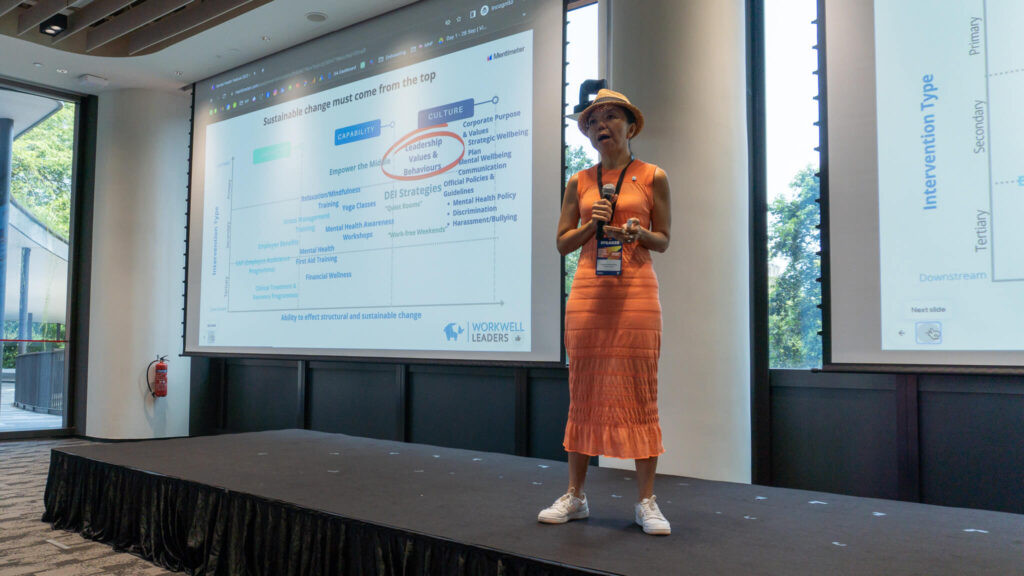
A study conducted by the National Council of Social Service (NCSS) demonstrates a remarkable return of S$5 for every S$1 invested, while another study reveals that New York companies witnessed their stock prices double or even triple when they made substantial investments in mental health.
In a similar vein, Nathan Andres, former Chief People Officer of The Body Shop, emphasises the intrinsic connection between employee wellbeing and organisational ethos. The Body Shop, for instance, advocates for a “fairer and more beautiful world,” Starbucks nurtures the human spirit, and Patagonia pledges to cause no one unnecessary harm.
According to Andres, “when wellbeing is embedded in the mindset and culture, engagement is going to flourish because leaders are constantly thinking about it.”
Catch up on his session or read our brief recap on his session here:
3. Modern stressors cannot be resolved with traditional mindsets.
Generational gaps aren’t exclusive to families; they’re prevalent in the workforce as well. If you grew up in an Asian household, you may have heard the saying: “I have eaten salt more than you have eaten rice” – a rhetoric that does more harm than good in organisations.
Associate Professor Daniel Fung, CEO of the Institute of Mental Health (IMH), stated in his session titled “CEO Perspectives: Collaborative Pathways of Public and Private Healthcare for Universal Access” that 80% of the population needs help coping with stress. The longer we take to acknowledge that every generation faces different stressors, the more work we will eventually have to do.
“In the old days, stress could be wondering where my next meal was coming from. Today, it could be asking: How do I feel about myself? How do I self-actualise?”
Associate Professor Daniel Fung, CEO of the Institute of Mental Health (IMH)
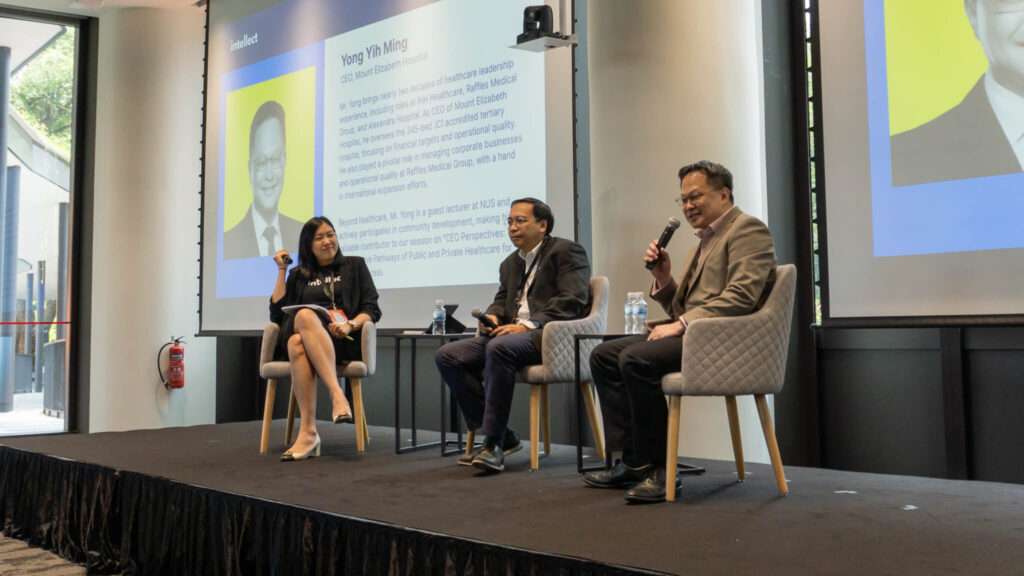
Catch up on the panel here:
4. Psychological safety and accountability can co-exist.
It’s no secret that psychological safety is key to a thriving organisation. In fact, according to Google’s Project Aristotle, it was crowned the most critical factor in successful teams. But can leaders truly be kind and fair at the same time? For Anthea Ong, the answer is yes. In her view, compassionate leadership doesn’t mean keeping underperforming team members. When push comes to shove, it’s how we support that person during their outgoing transition.
Creating an environment where employees feel comfortable expressing their ideas, concerns, and mistakes without fear of backlash doesn’t mean sacrificing accountability. If anything, it enhances it. When employees feel safe, they’re more likely to take ownership of their actions and hold themselves and their colleagues accountable for their work.
Catch up on her session here:
5. Invest in a mentoring culture, not a mentoring program.
Don’t get us wrong – mentoring programs can be beneficial. But for real transformation to take place, a mentoring culture has to be instilled, as emphasised by Shweta Shukla, Founder of The CultureGram, in her session titled “Empowering Leaders: Charting a Course to Mental Health Ownership and Sustainable Cultures.”
Catch up on her session here:
According to her, a mentoring culture goes beyond a formal mentoring approach. When experienced employees adopt a coaching mindset and willingly share their knowledge, experiences, and guidance with others, it facilitates better knowledge transfer and meaningful connections throughout the organisation. And, as usual, sustainable change starts at the top.
“Leaders have to enable this. Don’t wait for direct reports who are struggling to come to you – be proactive. Give them a safe space to bring their ‘failures’ up, as they may be predisposed to ‘pleasing’ us,” she said.
6. Get creative with destigmatising mental health at work.
Mark Czajowski, Chief Marketing Officer at Manulife, drew a parallel between the rising prominence of mental health coverage and the trajectory of critical illness coverage in the past decade—an encouraging upward trend. But as systemic change is brewing, how can organisations take matters into their own hands?
For S. Mahandran S. Subramaniam, Head of Wellness at MiCare Malaysia, destigmatising mental health in the Asian workplace isn’t confined to on-site talks and webinars. He does this with “discovery consultations” where employees can briefly chat with different subject matter experts about topics ranging from sleeping issues to marital problems and work stress:
“You speak to all of them for ten minutes each. Once an employee warms up to a counsellor, they may book a consultation separately.”
Catch up on his session here:
Not sure how to implement a mental health solution effectively? Check out our guide here.
7. Assess your ROI based on utility, not utilisation.
If you have to visit your dentist every week, is that an indication of good dental health? Probably not, says Intellect’s very own Dr. Oliver Suendermann, the VP of Clinical, who candidly addressed the shortcomings of traditional EAPs in his session titled “Making the Business Case for Mental Health: Inside the Region’s First ROI Study of a Wellbeing Programme.”
“Really, it’s a band-aid solution that can’t really shift the culture of your company. You’ve got to work with the leaders,” he stated.
Catch up on his sharing here:
Rather than fixating on adoption numbers, organisations would do well to assess the impact of their EAP on three levels. One, does it help reduce stress among your employees? Two, is it a catalyst for holistic wellbeing, encompassing financial, nutritional, and physical facets? Last but certainly not least, can it bring about cultural change and, consequently, employee engagement and retention?
Lutfi Ghani, Human Resource Director for Singapore and Malaysia, Kuehne + Nagel, weighed in on his experience with Intellect:
“One of the KPIs we had was attrition, coming out of the pandemic. During exit interviews, we noticed that many employees who left felt unsupported. (Later), we did see a significant drop in employees who wanted to leave due to (a lack of) work-life balance.”
Learn more about how Intellect can help your organisation achieve a 14x ROI in just 6 weeks and improve psychological resilience in just 24 hours.
8. Mental health benefits are a low-hanging fruit for talent recruitment.
In a competitive job market, offering comprehensive mental health support can set your organisation apart, as suggested by Colyn Chua, Head of Jardines Mindset, in her session titled “Lessons From the Largest Corporate CSR & Wellbeing Programme in the Region.” In her view, the concept of a “sandwiched generation” applies to the workplace as well.
Catch up on her session here:
“There is absolutely no way to hide the upward trend of mental health concerns among 18-49 year olds…3 out of 4 Gen-Zs will not even consider joining a company if there are no mental health provisions. It’s critical for us to bridge these gaps,” she said, likening the latter to a quick win in attracting young employees.
How do you know if you’re on the right track? Colyn suggests inserting a few questions about emotional support and the working environment in pulse surveys and performance appraisals. Read an organisational psychologist’s guide to measuring employee wellbeing here.
9. The answer to employee wellbeing could be right under your nose.
While policy changes are underway, what more can be done at the organisational level? Plenty, according to Associate Professor Yong Keng Kwang, Group Chief Nurse of the National Healthcare Group (NHG) in Singapore, who shared his strategies for managing 22,000 staff working in a high-pressure environment.
“Whether it’s physical or mental wellbeing, we want to detect when colleagues are in distress and put in the effort to help them recover,” he said. As such, mental health literacy and peer support system form the foundation on which NHG’s employee assistance program (EAP) is built on.
Catch up on Prof Yong’s session here:
Echoing his sentiments is Yong Yih Ming, CEO of Mount Elizabeth Hospital, who posed the question: Who should be responsible for the mental wellbeing of patients? In mental healthcare, where symptoms are more insidious than, say, having a fever, he stressed the importance of educating family members, coworkers, and supervisors to identify risk factors.
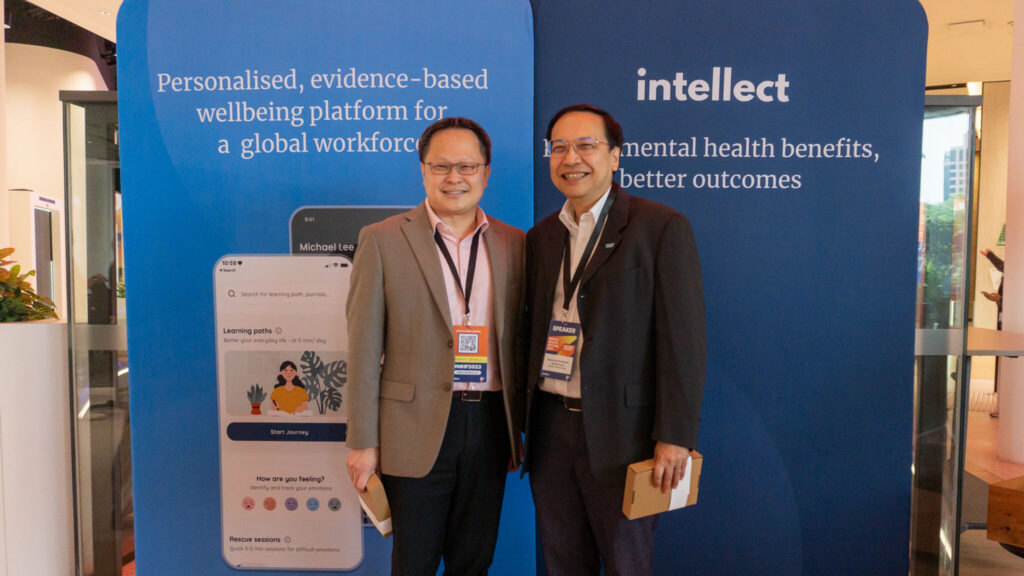
Mental Health First Aid™ can help bridge these gaps, and we’re proud to say that Intellect is the sole licensed provider of the course. Learn more about it here.
10. Employ different strokes for different folks.
Heineken has 700 employees across 19 different nationalities. The National University of Singapore (NUS) has a population of over 60,000 staff and students. Mercer deals with benefits not just for full-time employees but also the hourly workforce. What can we learn from these organisations about tailoring mental health benefits for a diverse audience?
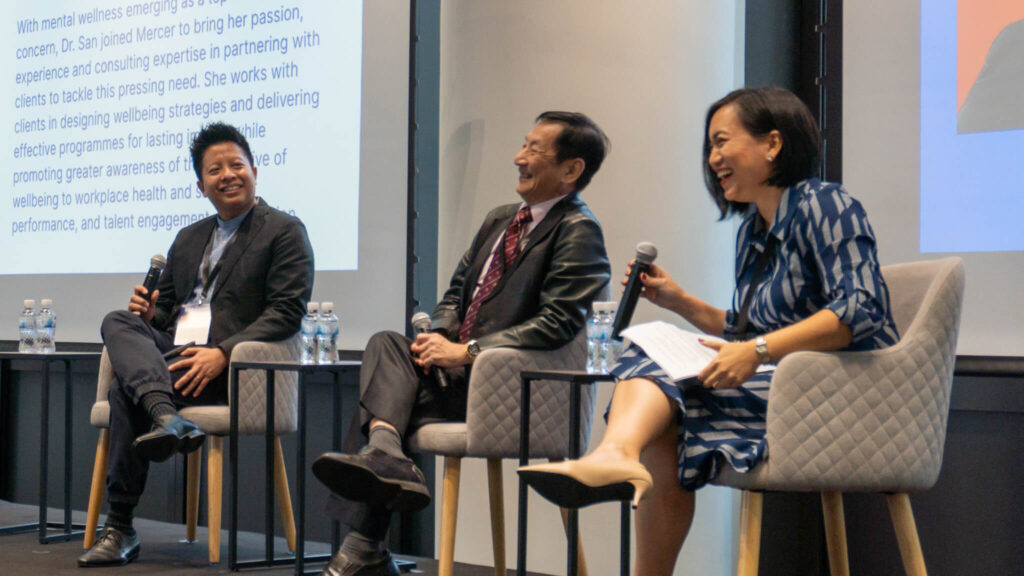
At the end of the day, there are very clever people who know a lot of concepts. The question is: How do you turn ‘mindware’ into ‘heartware’? There’s only one way to do this, and that is to make it personal.
Dr Janson Yap, Chief People Officer, National University of Singapore
Shaun Ee, Cluster Head of People at The HEINEKEN Company, added that this people-first mindset has to be genuine, as what work-life harmony looks like for one individual can be very different for another:
“Respect that every individual is an individual and ask: What’s going to give my employees energy? At the end of the day, our people aren’t digits. They’ve got ecosystems – their friends and families – behind them.”
Catch up on their insights here:
Intellect – personalised, scalable, effective
Wellbeing was once considered solely an individual responsibility, but the reality is that workplaces now wield more influence than ever before.
In the words of Anthea Ong, “we really cannot solve a problem with the same way of thinking that created it in the first place.” It’s encouraging to see that the new national strategy introduced by the Singaporean government on October 5, 2023, aligns with Intellect’s philosophy that mental wellbeing is a continuum, and it’s more beneficial to be proactive rather than reactive.
Learn more about Intellect’s services for businesses here.
